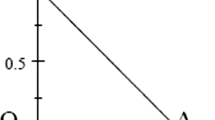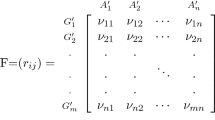Abstract
A measure of knowledge should not be viewed simply as a dual measure of entropy in the context of intuitionistic fuzzy sets as there is no natural logic between these two kinds of measures with the introduction of hesitancy, nor in the context of interval-valued intuitionistic fuzzy sets (IVIFSs), for that matter. This work is devoted to the introduction of an axiomatic definition of knowledge measure for IVIFSs. In order to do that, a set of new axioms is presented with which knowledge measure should comply in the context of IVIFSs. A concrete model following these axioms is then developed to measure the amount of knowledge associated with an IVIFS. Two facets of knowledge associated with an IVIFS, i.e., the information content and the information clarity, are simultaneously taken into account in the construction of the model to truly reflect the nature of an IVIFS. In particular, the connection between knowledge measure and fuzzy entropy is investigated under this axiomatic framework. A series of tests is also provided to examine the performance of the developed measure. Finally, a concept of knowledge weight on attribute in multi-attribute decision making is presented and an illustrative example is used as a demonstration of the application of the developed technique to decision making under uncertainty.
Similar content being viewed by others
References
Atanassov K (1986) Intuitionistic fuzzy sets. Fuzzy Sets Syst 20:87–96
Atanassov K (2012) On intuitionistic fuzzy sets theory. Springer, Heidelberg
Atanassov K, Gargov G (1989) Interval-valued intuitionistic fuzzy sets. Fuzzy Sets Syst 31:343–349
Das S, Dutta B, Guha D (2016) Weight computation of criteria in a decision-making problem by knowledge measure with intuitionistic fuzzy set and interval-valued intuitionistic fuzzy set. Soft Comput 20:3421–3442
Gao FJ (2013) Possibility degree and comprehensive priority of interval numbers. Syst Eng Theory Pract 33:2033–2040 (In Chinese)
Guo K (2012) Possibility degree method for determining weights of criteria in multiple attribute decision making with intervals. J Converg Inf Technol 7:206–215
Guo K (2014) Amount of information and attitudinal based method for ranking Atanassov’s intuitionistic fuzzy values. IEEE Trans Fuzzy Syst 22:177–188
Guo K (2016) Knowledge measure for Atanassov’s intuitionistic fuzzy sets. IEEE Trans Fuzzy Syst 24:1072–1078
Hung WL, Yang MS (2006) Fuzzy entropy on intuitionistic fuzzy sets. Int J Intell Syst 21:443–451
Jing L (2013) Entropy and similarity measures for interval-valued intuitionistic fuzzy sets based on intuitionism and fuzziness. Adv Model Optim 15:635–643
Liu XD, Zheng SH, Xiong FL (2005) Entropy and subsethood for general interval-valued intuitionistic fuzzy sets. Lect Notes Artif Intell 3613:42–52
Nguyen N (2015) A new knowledge-based measure for intuitionistic fuzzy sets and its application in multiple attribute group decision making. Expert Syst Appl 42:8766–8774
Nguyen N (2016) A new interval-valued knowledge measure for interval-valued intuitionistic fuzzy sets and application in decision making. Expert Syst Appl 56:143–155
Park JH, Park IY, Kwun YC, Tan X (2011) Extension of the TOPSIS method for decision making problems under interval-valued intuitionistic fuzzy environment. Appl Math Model 35:2544–2556
Sun M, Liu J (2012) New entropy and similarity measures for interval-valued intuitionistic fuzzy sets. J Inf Comput Sci 9:5799–5806
Szmidt E, Kacprzyk J (2001) Entropy for intuitionistic fuzzy sets. Fuzzy Sets Syst 118:467–477
Szmidt E, Kacprzyk J, Bujnowski P (2014) How to measure the amount of knowledge conveyed by Atanassov’s intuitionistic fuzzy sets. Inf Sci 257:276–285
Wang YM, Yang JB, Xu DL (2005) A preference aggregation method through the estimation of utility intervals. Comput Oper Res 32:2027–2049
Wei C, Zhang Y (2015) Entropy measure for interval-valued intuitionistic fuzzy sets and their application in group decision-making. Math Probl Eng. https://doi.org/10.1155/2015/563745
Wei C, Wang P, Zhang Y (2011) Entropy, similarity measure of interval-valued intuitionistic fuzzy sets and their applications. Inf Sci 181:4273–4286
Xu ZS (2007) Method for aggregating interval-valued intuitionistic fuzzy information and their application to decision making. Control Decis 22:215–219 (In Chinese)
Zadeh LA (1965a) Fuzzy sets. Inf Control 8:338–353
Zadeh LA (1965b) Fuzzy sets and systems. In: Proceedings of the symposium on systems theory, Polytechnic Institute of Brooklyn, New York, pp 29–37
Zadeh LA (1975) The concept of a linguistic variable and its application to approximate reasoning-I. Inf Sci 8:199–249
Zhang QS, Jiang S, Jia B, Luo SH (2010) Some information measures for interval-valued intuitionistic fuzzy sets. Inf Sci 180:5130–5145
Acknowledgements
This work is supported in part by the National Natural Science Foundation of China under Grant No. 71771110, the Planning Research Foundation of Social Science of the Ministry of Education of China under Grant No. 16YJA630014, and the Science & Technology Research Foundation of the Department of Education of Liaoning Province under Grant No. L2014011. The authors would like to thank the editors and the anonymous reviewers for their constructive comments and suggestions, which have greatly improved the presentation of this research.
Author information
Authors and Affiliations
Corresponding author
Ethics declarations
Conflict of interest
Both the authors, their immediate family, and any research foundation with which they are affiliated did not receive any financial payments or other benefits from any commercial entity related to the subject of this article.
Publisher’s Note
Springer Nature remains neutral with regard to jurisdictional claims in published maps and institutional affiliations.
Additional information
Communicated by V. Loia.
Rights and permissions
About this article
Cite this article
Guo, K., Zang, J. Knowledge measure for interval-valued intuitionistic fuzzy sets and its application to decision making under uncertainty. Soft Comput 23, 6967–6978 (2019). https://doi.org/10.1007/s00500-018-3334-3
Published:
Issue Date:
DOI: https://doi.org/10.1007/s00500-018-3334-3




